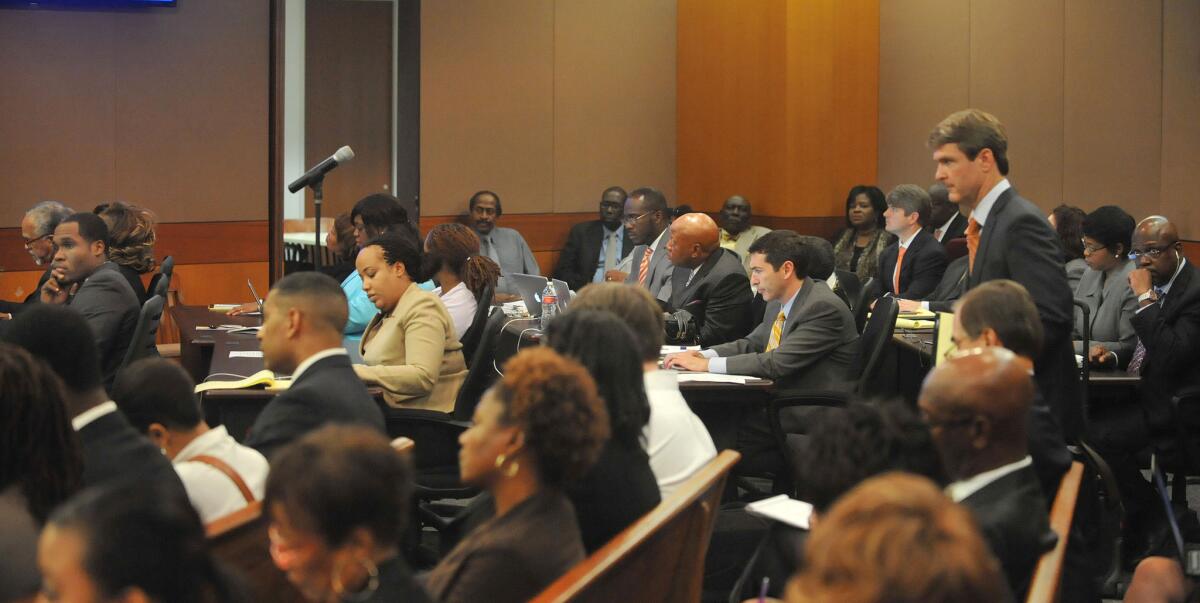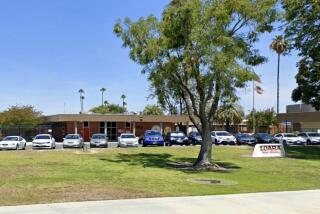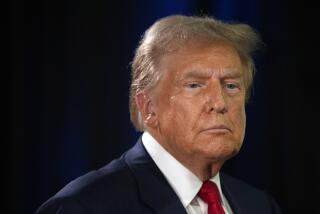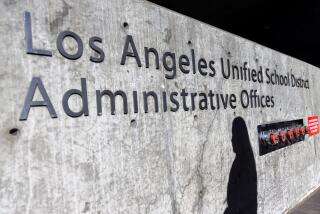‘Children were robbed’ in Atlanta school cheating case, prosecutor says

Prosecutors and defense attorneys began Monday to wrap up the sprawling Atlanta public school cheating case, in which a dozen former teachers and administrators stand accused of engaging in a massive criminal conspiracy to inflate scores on standardized tests.
“Each and every one of them is guilty, guilty, guilty,” Clinton Rucker, chief senior assistant district attorney for Fulton County, told the jury as he began closing arguments. “The evidence is overwhelming.... Thousands of our children were robbed of the opportunity to get a quality education.”
Rucker described the Atlanta case — one of the largest and most complex academic misconduct trials in U.S. history and the first in which elementary school teachers face charges of racketeering — as “unprecedented in our community.”
All 12 defendants are charged with violating Georgia’s Racketeer Influenced and Corrupt Organizations Act, which is typically associated with gangsters. Many face additional counts of influencing witnesses, making false statements and writings, and theft by taking. Some face up to 35 years in prison.
Only two defense teams had time to present arguments Monday after the prosecution team, and both were scornful of the state’s charges, particularly the RICO count. Prosecutors, they argued, had failed to prove beyond a reasonable doubt that their clients had knowingly or willingly entered into any conspiracy.
“There’s no question there was cheating going on,” said Robert Rubin, attorney for Dana Evans, a former principal at Dobbs Elementary School. Yet the high number of wrong-to-right erasures on student tests, he argued, did not show his client was guilty. “The data doesn’t tell you who, what, when, where and why.”
Evans was a conscientious new principal who was targeted by a few former employees after trying to turn around the culture at her school, Rubin argued. Two of the witnesses who testified against Evans, Rubin noted, were long-standing cheaters who illegally boosted their students’ test scores before they knew Evans or taught at her school.
During the nearly six-month trial, prosecutors called on more than 130 witnesses — students, teachers, parents, testing experts, even former Georgia Gov. Sonny Perdue — to present a story of a widespread criminal enterprise within the Atlanta Public Schools system.
The defendants — who all worked at underperforming schools — stand accused of conspiring to change students’ answers on tests to ensure schools met new high-stakes testing goals. Teachers whose students performed well received bonuses, while those who failed to meet targets were threatened with demotion or termination.
The prosecution team, which was given five hours to summarize its case, characterized the Atlanta schools as a pyramid system designed to create a false impression of academic success, with teachers and administrators routinely cheating, lying and stealing.
“These defendants want to come here and look at you with a straight face and tell you they didn’t know,” Rucker said. “Dr. Hall knew.”
Beverly L. Hall, the schools’ former superintendent, died of breast cancer on March 2, barely a week after testimony ended.
With the alleged mastermind of the scheme gone, the defendants consist of five elementary school teachers, two testing coordinators, an assistant principal, a principal and three superintendents. During testimony, none of the defendants took the stand. Four called witnesses, and the rest relied on previous cross-examinations of prosecution witnesses.
Prosecutors reminded jurors that scores of witnesses had testified that educators had stolen exam booklets before tests, or met with other teachers after tests to change wrong answers. Some witnesses said they saw defendants cheating, including blatantly holding pencil erasers over test sheets.
Others said they witnessed defendants pressuring others to cheat or turning a blind eye to cheating.
Yet defense attorneys cast doubt on the moral credibility of the prosecution’s witnesses, many of whom, they noted, had admitted to cheating and received plea deals or immunity in exchange for testifying. Some made contradictory statements, had poor performance records or were motivated by petty vendettas, they argued.
“Why should you not blindly buy the state’s allegations?” said Keith Adams, who represents Diane Buckner-Webb, a former teacher at Dunbar Elementary School. “They’re putting witnesses on the stand who they know had lied previously under oath.”
Defense teams have each been given an hour to speak for their clients. The remaining 10 are expected to summarize arguments through Wednesday.
The trial marks the culmination of a five-year investigation ordered in 2009 by Perdue in response to suspicious jumps in the state-mandated Criterion-Referenced Competency Tests. A 2011 report implicated more than 180 educators and administrators in “organized and systemic misconduct” in 44 of 56 Atlanta schools.
Almost two years later, 35 educators and administrators were indicted. That number was gradually whittled down before the trial began as one defendant passed away and 21 others pleaded guilty, receiving reduced sentences of probation in exchange for aiding prosecutors.
The trial has been elaborate and painfully repetitive, with jurors presented with 27 separate counts, in addition to the RICO charge, and multiple witnesses and attorneys offering conflicting interpretations of events.
In closing, Rucker focused on the cheating’s human toll, noting that thousands of low-income African American students who struggled to read and write were denied the opportunity of federal funds for remedial education. While Rucker dismissed the idea that the case was about race or politics, he took pains to emphasize the importance of education in the Deep South’s civil rights history, exhibiting sepia photos of famed African American leaders, such as James Farmer and the Rev. Martin Luther King Jr., on the courtroom walls.
“That man gave his life so we’d all get a quality education,” Rucker said of King. “How many James Farmers did we lose that will never realize their dream?”
Yet no matter how many students faced setbacks as a result of the cheating, the prosecution’s main hurdle is to convince jurors that these specific defendants engaged in a racketeering conspiracy. To do so, they have to prove there were at least two crimes for a common goal.
John Floyd, a prosecutor who specializes in racketeering cases, explained to jurors that most conspiracies involve two or more conspirators agreeing on a common criminal objective and acting in furtherance of the conspiracy. To conclude the defendants engaged in racketeering, they need only find two acts of racketeering by any co-conspirators, rather than two acts by each defendant.
Yet defense attorney Adams insisted that the state had failed to prove his client, Buckner-Webb, changed students’ answers or was part of any conspiracy. “You don’t become a conspirator just because you work for Atlanta Public Schools,” he said. “That’s nonsense. Things have got to make sense, folks.”
nation@latimes.com
More to Read
Sign up for Essential California
The most important California stories and recommendations in your inbox every morning.
You may occasionally receive promotional content from the Los Angeles Times.










